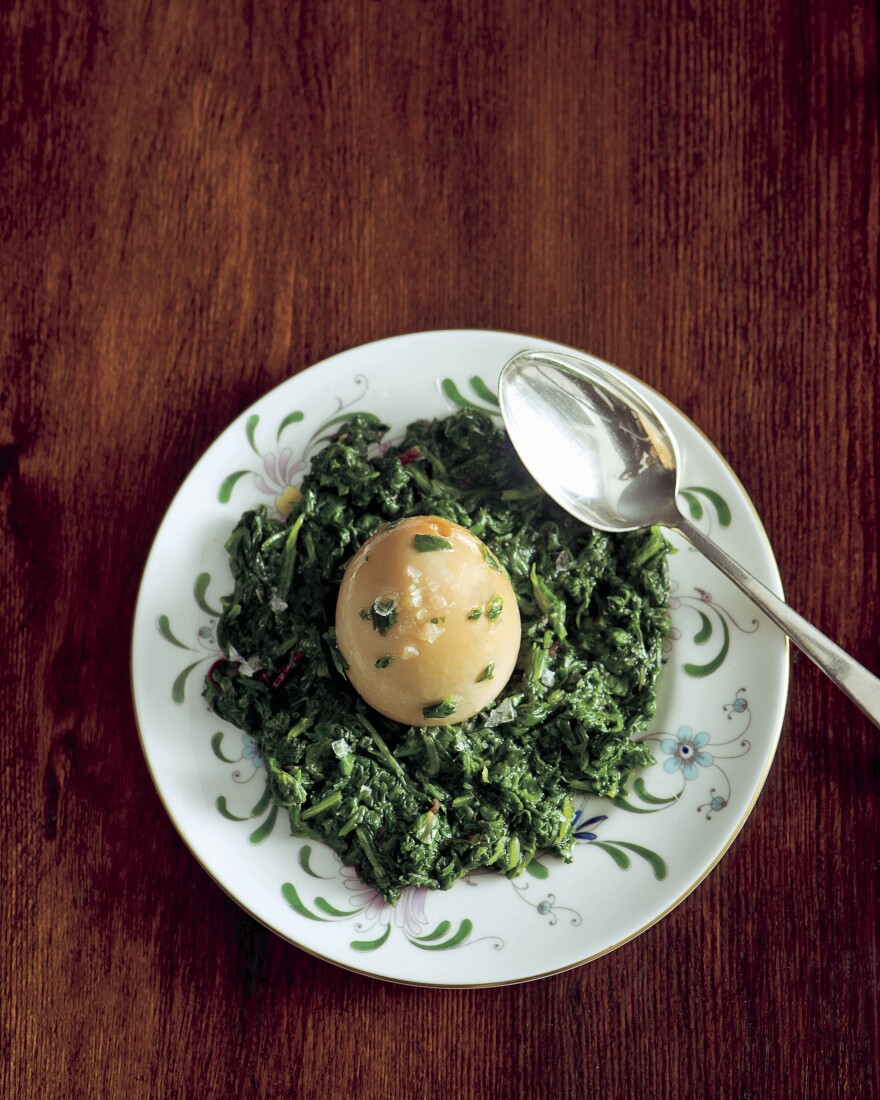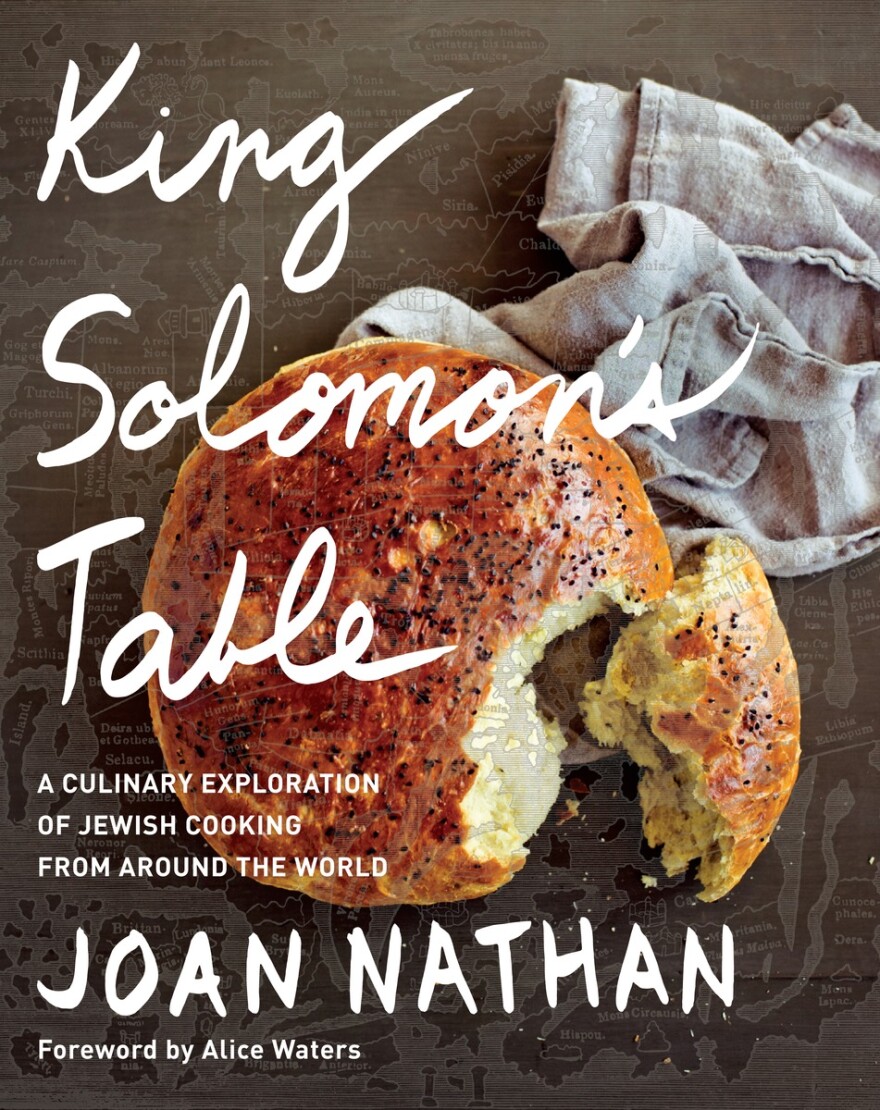I'm getting ready to explain who I am when Joan Nathan answers the phone.
“Amy?”
She already knows my name, which shouldn’t surprise me – since she seems to know just about everything.
The internationally-acclaimed author is about to begin touring to launch her new book, King Solomon’s Table: A Culinary Exploration of Jewish Cooking from Around the World. But with her nearest stop in Baltimore, 400 miles from Charlotte, we had to visit by phone. Here are some highlights from our conversation.
AR: People always want to know what esteemed food writers eat for breakfast.
JN: OK. I like to eat all the time, that’s the problem. When I'm alone I try to eat just a hard-boiled egg and lots of sautéed greens. I garden. But when I'm going to a restaurant, or a brunch with friends, I love huevos rancheros. For Passover, I’ll be making Matzo Chilaquiles. For breakfast and lunch, I try to just have a hard-boiled egg and a salad so I can eat whatever I want for supper.
AR: When you’re cooking at home do you plan exhaustively, or do you just go to the fridge like the rest of us and see what’s there?
JN: It depends. I try to do my testing for Friday night dinners. I’ll test maybe five recipes, and the leftovers we can use for a few days. I get invited out a lot but when I'm cooking at home, very often I’ll just grill fish, make a roast chicken – which I love – or sometimes just soup and salad for my husband and me.
AR: People are always afraid to cook for accomplished food professionals. Any advice?
JN: Cook what you know, cook what you’re comfortable with.
I remember Julia Child’s 90th birthday. I had offered to do a small dinner in Washington. I thought, “What am I going to cook for her?” My son who’s now 31 was 14 or 15 at the time, and we drove all the way from Martha’s Vineyard thinking about this menu. I made her what I knew and it was a pretty simple menu. My son had been working for a chef. He made zucchini blossoms filled with cheese and he fried them as an hors d’oeuvre. I took salmon and I put za’atar (the Middle East spice combination with wild thyme) on it, and preserved lemons. I make my own preserved lemons, and I just baked it. It was summer so we had beautiful mixed tomatoes, basil, good vinegar, and good oil. And corn with basil butter. For dessert, I made an apricot crisp with ice cream. It was a very simple dinner. She loved it, and everybody else loved it. I did what I knew how to do.
It’s nice to get invited but I don’t care what people give me. I'm like anybody else: I like a good meal but it’s the people that count.
AR: Are there any foods you just can’t get enough of?
JN: Oh man. Well, I love mushrooms. Believe it or not, I like buckwheat groats. I think they’re delicious with onions and mushrooms. I love lemons in any way. And I like good chocolate; good, not-too-sweet chocolate. The diehards are making it so unsweet; that I don’t like. And I love a good roast chicken. A good bottle of wine.
AR: Is there anything you just don’t like?
JN: I'm not a big lover of anchovies. I adore truffles but I don’t like truffle oil.
AR: When you’re not researching and writing about Jewish food, are there other cuisines you especially enjoy?
JN: I like Hungarian cuisine a lot, and all Middle Eastern cuisines. I love Palestinian food. There’s a Palestinian chicken called musakhan, from when I lived in Israel, that I adore. It’s the best chicken in the world. It’s chicken, sautéed onions, pine nuts, sumac, and a tiny bit of cloves, cinnamon. And I know how to make it really, really well.
AR: Are there any kitchen gadgets that you love or hate?
JN: I love to use a dough scraper, and a hand lemon-squeezer. I’ve never found an electric can-opener I like, so I threw them all out. I like a really sharp knife. You don’t need that many knives. You need a chef’s knife, a paring knife, a boning knife, and a bread knife. I don’t like silicone oven gloves; they’re really awkward to use.
AR: Let’s talk about charoset [the traditional, sweet paste of fruit and nuts eaten at Passover]. In a world where we have everything in charoset from bananas to blueberries, is there anything where we draw the line?
JN: There’s never been a charoset I think is ridiculous. But the problem now is nut allergies. So I always make about five different ones, to show the “wandering of the Jews,” and one nut-less.
AR: You haven’t been to Charlotte, have you?
JN: I think I was at the airport. I know Charlotte is becoming a real culinary capital. I’d love to come and talk to you.

Huevos Haminados con Spinaci, Long-Cooked hard-Boiled Eggs with Spinach
yield: 12 to 16 servings
12 to 16 large eggs, preferably fresh from a farmers’ market
4 tablespoons olive oil
1 large (about 225 grams) red onion, peeled and coarsely chopped (1 ½ cups)
1 tablespoon sea salt
1 teaspoon freshly ground black pepper
1½ pounds (680 grams) spinach, fresh or frozen (thawed and drained if frozen)
One of the most ancient symbols of birth, rebirth, and mourning is the incredible egg. Observant Jews eat them for breakfast or lunch on the Sabbath, cooked overnight in their Sabbath stew or boiled in water laced with onions or coffee for flavor and a dark color.
The symbol of the round, smooth egg for rebirth is especially universal in the spring, the time of an abundance of eggs because there is more daylight, and more for hens to eat. “Factory” hens will still lay eggs through the winter because they are kept under artificial lighting and tricked into thinking it is spring and summer because there is more light.
Eggs, a product of the fowl domesticated by the Chinese in about 1400 b.c.e. and then shipped west, are significant in cultures the world over—from ancient Persia to modern India, from small Italian villages to mainstream America. In Jewish communities, the egg is also a symbol of mourning, both personally and communally. When someone in an observant Jewish family dies, the first thing that is traditionally eaten after the funeral is a hard-boiled egg.
As a community, Jews put a roasted egg on the Seder plate as a symbol of life and of mourning for the destruction of the First and Second Temples of Jerusalem. And many Jews have the custom of starting the Passover Seder with eggs, either cooked in salt water or even cooked overnight in sand, a custom still followed today in North Africa.
This recipe for long-cooked eggs with spinach came from the island of Corfu, Greece, to Ancona, Italy, a seaport on the Adriatic coast. I tasted it in Rome, loved it, and it is now a keeper at our Passover Seder. Daisy Dente Modigliani, who shared this recipe with me, hard-boils sixty eggs to serve as the first course of her Passover Seder for both the first and second nights.
This recipe has replaced our simpler family Passover tradition from Poland of serving hard-boiled eggs in salt water, a custom I learned from my mother-in-law when I married my husband many years ago.
1. Put the eggs in a cooking pot and add water to cover by about 2 inches. Then add the olive oil, onions, salt, and pepper. Bring to a boil over medium-high heat, then lower heat and simmer for 30 minutes. Cool and remove the eggs with a slotted spoon. Tap the eggs gently against the counter and peel under cold running water, keeping them as whole as possible.
2. Return the peeled eggs to the pot with the seasoned water and simmer very slowly uncovered for at least 2 hours, or until the water is almost evaporated and the onions almost dissolved. The eggs will become dark and creamy as the cooking water evaporates and they absorb all the flavoring.
3. Remove the eggs carefully to a bowl, rubbing into the cooking liquid any of the cream that forms on the outside. Heat the remaining cooking liquid over medium heat, bring to a simmer, and add the spinach. Cook the spin- ach until most of the liquid is reduced, stirring occasionally with a wooden spoon, about 30 minutes, or until the spinach is creamy and well cooked. Serve a dollop of spinach with a hard-boiled egg on top as the first part of the Seder meal or as a first course of any meal
Note To see if the eggs are really boiled, remove one egg from the water and spin it on a flat cutting board. If it twirls in one place, it is hard-boiled. If it wobbles all over the board, it is not cooked yet and the weight isn’t distributed evenly. The easiest way of peeling a hot hard-boiled egg is to put it under cold water between your hands and rub it quickly until it cracks, then peel under the running water.
To prepare the symbolic egg for the Passover Seder plate, boil the egg in its shell, dry it, and then light a match underneath to char it.
Excerpted from KING SOLOMON’S TABLE by Joan Nathan. Copyright © 2017 by Random House. Excerpted by permission of Alfred A. Knopf, a division of Random House LLC. All rights reserved. No part of this excerpt may be reproduced or reprinted without permission in writing from the publisher.



